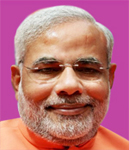NITI Aayog replaces Planning Commission
New Delhi,
Thu, 01 Jan 2015
NI Wire
Last year PM Modi announced on Independence Day that the Planning Commission
would be replaced, on Thursday Govt. renamed the Planning Commission as 'Neeti
Ayog'. The
announced
a new institution named NITI Aayog
(National Institution for Transforming India)
as the replacement of
Planning Commission.
This is the first step towards replacing the Planning Commission with the
new-age institution. Resolution issued by the cabinet gave the details of the
new institutions.
The institution to give life to these aspirations is the NITI Aayog (National Institution for Transforming India). This is being proposed after extensive consultation across the spectrum of stakeholders including inter alia state governments, domain experts and relevant institutions. The NITI Aayog will work towards the following objectives:
-
To evolve a shared vision of national development priorities, sectors and
strategies with the active involvement of States in the light of national
objectives. The vision of the NITI Aayog will then provide a framework
‘national agenda’ for the Prime Minister and the Chief Ministers to provide
impetus to.
-
To
foster cooperative federalism through structured support initiatives and
mechanisms with the States on a continuous basis, recognizing that strong
States make a strong nation.
-
To develop mechanisms to formulate credible plans at the village level and
aggregate these progressively at higher levels of government.
-
To ensure, on areas that are specifically referred to it, that the interests
of national security are incorporated in economic strategy and policy.
-
To pay special attention to the sections of our society that may be at risk
of not benefitting adequately from economic progress.
-
To design strategic and long term policy and programme frameworks and
initiatives, and monitor their progress and their efficacy. The lessons
learnt through monitoring and feedback will be used for making innovative
improvements, including necessary mid-course corrections.
-
To provide advice and encourage partnerships between key stakeholders and
national and international like-minded Think Tanks, as well as educational
and policy research institutions.
-
To create a knowledge, innovation and entrepreneurial support system through
a collaborative community of national and international experts,
practitioners and other partners.
-
To offer a platform for resolution of inter-sectoral and inter-departmental
issues in order to accelerate the implementation of the development agenda.
-
To maintain a state-of-the-art Resource Centre, be a repository of research
on good governance and best practices in sustainable and equitable
development as well as help their dissemination to stake-holders.
-
To actively monitor and evaluate the implementation of programmes and
initiatives, including the identification of the needed resources so as to
strengthen the probability of success and scope of delivery.
-
To focus on technology upgradation and capacity building for implementation
of programmes and initiatives.
-
To undertake other activities as may be necessary in order to further the
execution of the national development agenda, and the objectives mentioned
above.
- The NITI Aayog will comprise the following:
- Prime Minister of India as the Chairperson
- Governing Council comprising the Chief Ministers of all the States and Lt. Governors of Union Territories
- Regional Councils will be formed to address specific issues and contingencies impacting more than one state or a region. These will be formed for a specified tenure. The Regional Councils will be convened by the Prime Minister and will comprise of the Chief Ministers of States and Lt. Governors of Union Territories in the region. These will be chaired by the Chairperson of the NITI Aayog or his nominee.
- Experts, specialists and practitioners with relevant domain knowledge as special invitees nominated by the Prime Minister
- The full-time organizational framework will comprise of, in addition to the Prime Minister as the Chairperson:
i. Vice-Chairperson: To be appointed by the Prime Minister
ii. Members: Full-time
iii. Part-time members: Maximum of 2 from leading universities research organizations and other relevant institutions in an ex-officio capacity. Part time members will be on a rotational basis.
iv. Ex Officio members: Maximum of 4 members of the Union Council of Ministers to be nominated by the Prime Minister.
v. Chief Executive Officer : To be appointed by the Prime Minister for a fixed tenure, in the rank of Secretary to the Government of India.
vi. Secretariat as deemed necessary
Source: PIB


